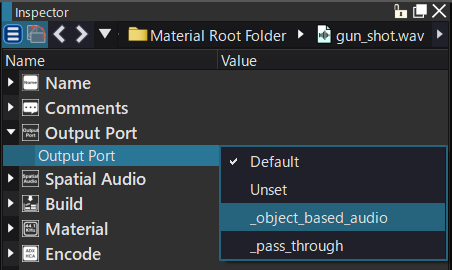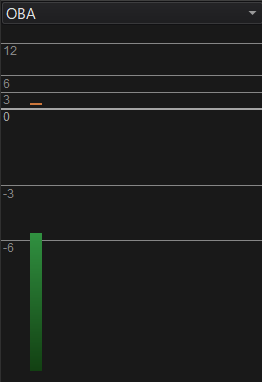This feature is used to perform playback using monaural audio and positioning information.
Similar to conventional 3D positioning, Object-Based Playback uses the positioning information calculated from the coordinates of the Source and the Listener.
However, unlike 3D positioning, Object-Based Playback cannot convert (pan) to multi-channel audio - such as 5.1 ch or 7.1 ch - or mix channels using ADX. (When using a software binauralizer, conversion can happen in the spatializer, at the final stage of the ADX output.)
This section explains how to create Materials for Object-Based Audio playback, and how to use them to create and preview Cues.
- Material settings
- Output Port for Object-Based Audio
- Using Materials for Object-Based Audio in a Cue
- Object-Based Audio preview
- Using platform-specific Object-Based Audio playback features
Material settings
As Object-Based Audio uses a different rendering path during playback than regular channel-based audio, it is output using a dedicated mixer (ASR rack).
Therefore, you must indicate that the Materials will be played back using Object-Based Audio.
This can be done via the Output Port items of the Materials.
Set the output port of the Materials to "_object_based_audio" as shown below:
| Items | Settings |
|---|---|
| Output Port | Assign via _object_based_audio |

- Attention
- Waveforms used for Object-Based Audio must be mono.
Note that if you set "_object_based_audio" to a non-mono Material, an error will occur during the ACB build.
Output Port for Object-Based Audio
When setting the "_object_based_audio" with Material settings the following "Object-Based Audio"-specific Output port will be created in the Output Ports of Global Settings.
| Object-Based Audio-specific Output Port name |
|---|
| _object_based_audio |
- Note
- When an ACF with the "_object_based_audio" output port set is registered at run-time, a mixer for Object-Based Audio playback (ASR rack) will be automatically created.
Setting for Object-Based Audio output ports
Output ports for Object-Based Audio offer these settings:
| Setting | Value | Description |
|---|---|---|
| Use a dedicated mixer | True (Locked) | Assign whether to use a dedicated mixer. Object-Based Audio playback always uses a dedicated mixer (Channel-based), different from the main mixer. |
| Fallback behavior | No playback / Fallback playback via the main output / Fallback playback via the dedicated output | In case of playback without Object-Based Audio settings or when the audio playback limit has been reached, this setting determines the type of playback used as fallback for Object-Based Audio. |

Using Materials for Object-Based Audio in a Cue
By dragging and dropping a Material with Object-Based Audio settings on a Cue Sheet, a Cue compatible with Object-Based Audio playback will be created.
(Drag and drop the Material directly onto a Cue to create a track compatible with Object-Based Audio playback.)
The output port setting of the Material will automatically be reflected in the output port setting of the track.
.

- Note
- Automatic registration of the Output Port for Object-Based Audio in a track
When a Material for Object-Based Audio is added to a track, the output port for Object-Based Audio is automatically added. However, if the waveform region is moved to another track, the output port of the new track will not be automatically updated.
Please assign the output port manually. - Mixing Object-Based Audio with other channel configurations
Note that multi-channel waveforms, such as stereo, 5.1 ch, or 7.1 ch, cannot be used on tracks set for Object-Based Audio.
If you need to use waveforms for Object-Based Audio and other channel configurations in the same Cue, they must be placed on separate tracks.
- Automatic registration of the Output Port for Object-Based Audio in a track
Object-Based Audio preview
Object-Based Audio Level Meter display
Audio playback via Object-Based Audio is visualized on a dedicated level meter marked with OBA.
The number of graphs displayed by the level meter correspond to the number of sounds being played back using Object-Based Audio.
(Max: 16 sounds. If more than 16 such sounds are played back, the channel-based level meters will be used.)

Preview via headphones
To preview Object-Based Audio via headphone, in the Software Binauralizer settings, enable "Binaural playback" using PC Preview Speaker Settings .
Using platform-specific Object-Based Audio playback features
To play back Object-Based Audio using platform-specific features (instead of using software processing common to all platforms), enable "Platform support features for OBA and Ambisonics" in Global Project Settings .
Note that if you also use the Software Binauralizer setting which enables the software binauralizer, it will be used instead of the hardware features.
To only use the Object-Based Audio playback features of the platform, "Disable" the Software Binauralizer instead.